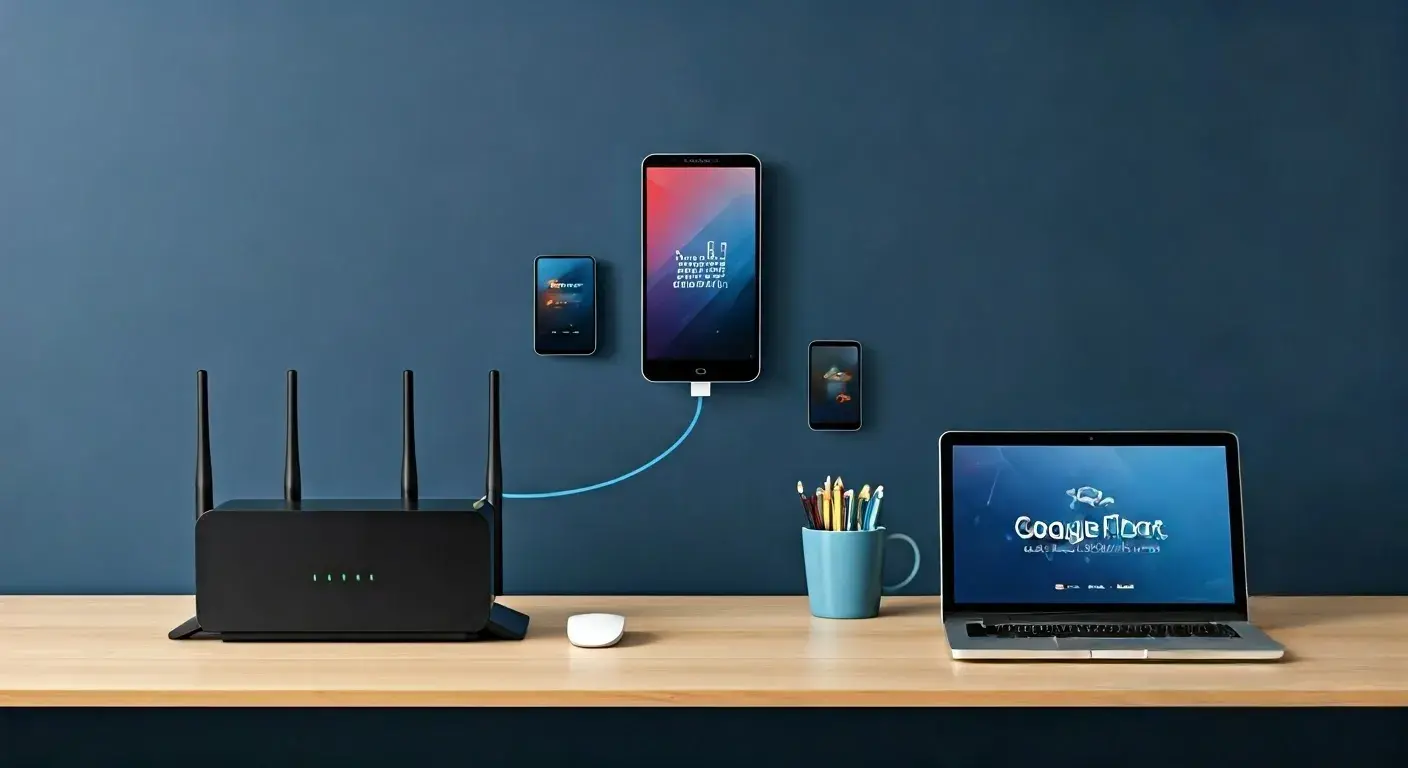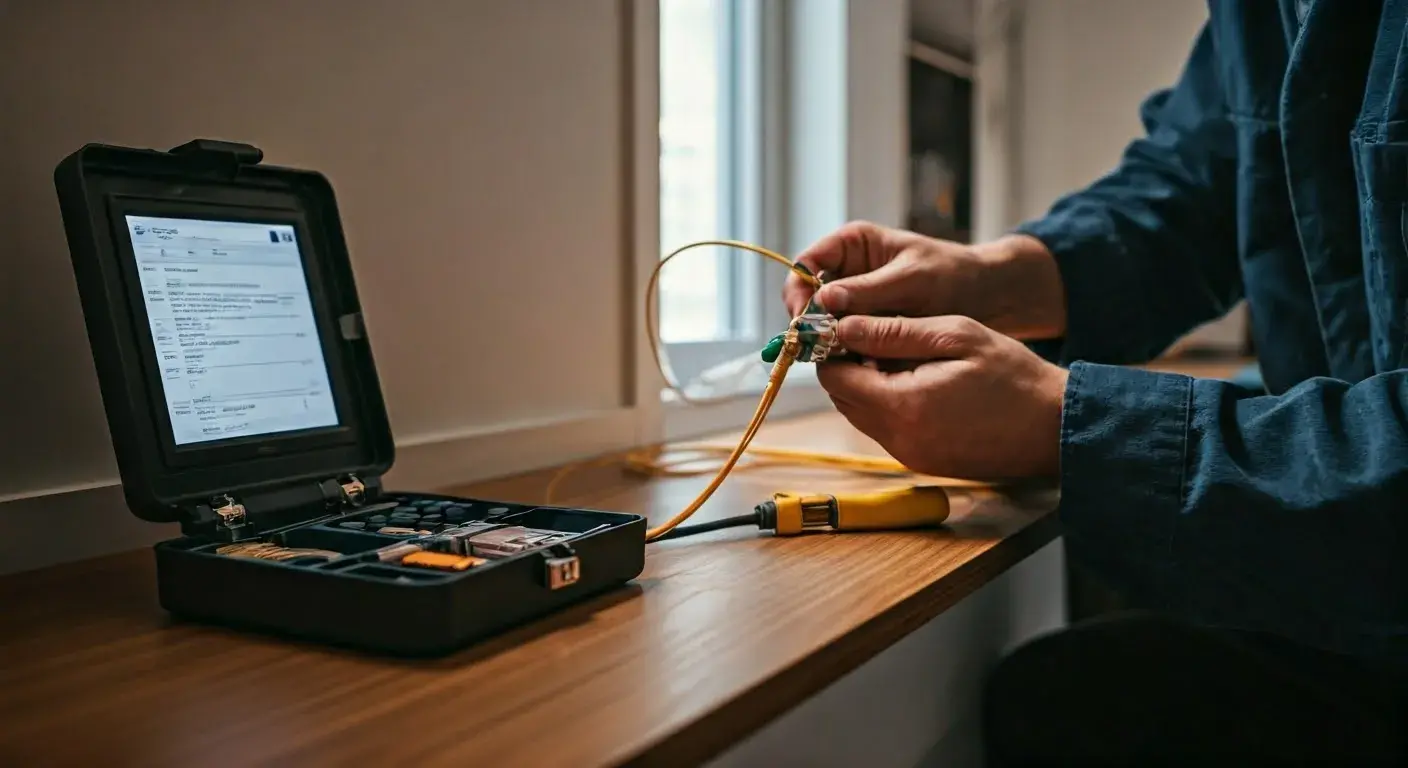Mastering Fiber Internet: Benefits & Advantages

In today's digital world, having reliable internet is very important. Whether you are streaming shows, working from home, or chatting with family online, a speedy and strong internet connection is essential. That is where fiber internet comes in. This new technology is changing the way we use the internet. Fiber internet offers much faster speeds and better reliability than traditional services. This makes it a big improvement for people at home and businesses too.
Understanding Fiber Internet Technology
Fiber internet is different from other types of internet. It uses a unique way to send data. Instead of using electrical signals through copper wires like cable or DSL, fiber internet uses light.
This difference makes a big impact. Data is sent as light pulses through thin strands of glass. This way, it moves much faster and is less likely to face interruptions. As a result, customers enjoy a faster, more reliable internet experience.
The Basics of Fiber Internet
Optic internet, also called fiber internet, changes how we connect to the internet. It sends data as light signals through very thin strands of glass or plastic fibers. This is different from regular copper internet services. Because of this, fiber internet offers amazing speed, reliability, and more bandwidth.
Think of it like a stream of light pulses carrying huge amounts of data fast, at the speed of light. That’s what fiber optic internet is all about.
The light signals travel through the optic cables that are grouped to form the cable system we use. At the end user’s side, a special device named an optical network terminal (ONT) gets these light signals and changes them back into digital data for your devices to use.
How Fiber Internet Differs from Other Internet Technologies
To see the benefits of fiber internet, we should look at how it is different from other types of internet.
-
Cable internet uses coaxial cables, which also bring cable TV to your home.
-
It can give decent speeds, but the speeds are not great. This is because it uses electrical signals, which can fade over long distances.
-
Satellite internet works by sending signals to a dish at your location.
-
It has a wider reach, especially in rural places. But it often has high latency, which means there is a delay between asking for data and getting it. This happens because the signals have to travel a long way.
Fiber optics is a better choice because it fixes these problems.
-
It sends data as light.
-
That means fiber optic internet can be much faster, have lower latency, and offer more bandwidth than cable or satellite internet.
The Core Benefits of Fiber Internet
Fiber internet is more than just faster speeds. It offers many benefits for users. This new technology leads to better work, smooth entertainment, and improved communication.
With fiber, you can download large files in seconds. You can also enjoy video calls without any lag. These increased speeds and reliability make your daily online experiences much better.
Unparalleled Speeds: What to Expect
One big advantage of fiber internet is its amazing speed. While cable internet often fails to give equal download and upload speeds, fiber internet does it well. It provides much higher speeds for both downloading and uploading data.
This makes tasks like downloading big files, watching 4K videos, and joining video calls much quicker and easier. Picture this: downloading a full HD movie in just a few seconds or uploading a huge presentation to the cloud almost instantly.
Fiber internet makes this possible. Its faster speeds cut down annoying wait times and boost productivity for both people and businesses.
Reliability and Stability in Your Internet Connection
Fiber optic technology offers very reliable internet connections. This is because fiber optic cables can handle environmental factors and electromagnetic interference much better than traditional copper wires.
Fiber internet connections do not slow down as much during busy times. This is often a big problem for cable internet users.
Additionally, fiber optic connections provide symmetrical upload and download speeds. This means you can have a smooth online experience, even if many devices are connected and using the internet. Lower latency also helps create a faster connection, making activities like online gaming and video conferencing much more enjoyable.
Advantages of Fiber Internet for Businesses
For businesses that need a strong online presence, fiber internet is crucial. It's not just a connection; it’s a key benefit. With its higher bandwidth and symmetrical speeds, businesses can work better and speak to their teams without issues. This helps them provide great service to their customers.
Fiber internet also supports cloud apps and makes video conferencing smooth. It helps businesses succeed in today’s digital world.
Supporting Cloud-Based Operations with Ease
As more businesses use cloud services, a strong internet connection is very important. Fiber internet offers higher bandwidth and the same upload and download speeds. This works well with cloud apps, helping data move quickly and making real-time teamwork easier.
Whether you want to use customer relationship management (CRM) tools, work on shared documents, or save important data, fiber internet helps these cloud tasks run smoothly.
The high bandwidth supports many users at once. This stops slowdowns or breaks in service. The close connection with cloud technologies makes fiber internet a must-have for businesses that are moving to the cloud.
Enhancing Remote Work Capabilities
Reliable internet is very important for remote work. Fiber internet is a great solution. It offers speed, stability, and enough bandwidth for effective remote work experiences.
With the same upload and download speeds, people can join video conferencing calls without any delays or problems.
Tasks that require a lot of data, like moving large files or using cloud-based apps, can be done easily. This saves time and boosts productivity. Fiber internet helps companies support remote work while keeping efficiency and performance high.
The Impact of Fiber Internet on Online Gaming and Streaming
For online gamers and people who love streaming, having a smooth and quick experience is very important. Fiber internet is the perfect answer. It offers great speed and low delay, leading to a whole new level of fun.
Gamers no longer have to worry about buffering. They enjoy super-fast response times, which helps them play better. At the same time, streaming services can show clear 4K content without any lag, changing regular living rooms into high-quality theaters.
Revolutionizing Online Gaming with Faster Speeds
For serious online gamers, winning or losing can depend on milliseconds. Fiber internet offers really fast speeds and much lower latency. This gives gamers an advantage, making the gameplay smoother and more fun to play.
When you play fast-paced online games, quick decisions matter a lot. Fiber internet makes sure your moves are registered right away, so you won’t have to deal with lag.
With lower ping rates and a steady connection, gamers can enjoy the game fully. You can take part in the action without worrying about your internet connection slowing you down. That’s why fiber internet is essential for any serious gamer.
Seamless Streaming Experiences with High Bandwidth
Streaming is now a big part of how we enjoy entertainment. But buffering and breaks can spoil the fun. Fiber internet offers high speeds and strong access, helping to deliver a smooth streaming experience.
Whether you are watching your favorite shows in 4K, catching live sports, or enjoying high-quality music, fiber provides the speed needed for clear playback.
You can also stream on many devices at the same time without slowing down. This means everyone at home can enjoy what they like without any problems. Fiber internet is the perfect choice for anyone who loves to stream.
Fiber Internet and Smart Home Technology
As smart home technology gets better, having a reliable internet connection is important. Fiber internet plays a big role. It helps your smart home devices work well together and allows you to enjoy all the benefits of connected living.
With a fast fiber connection, everything runs smoothly. This includes smart appliances, security systems, voice assistants, and entertainment centers. A strong fiber internet connection means that all your devices can perform their best.
The Backbone of Smart Home Connectivity
As we fill our homes with more and more smart devices, a strong and dependable internet connection is very important. Fiber internet is the best choice because it offers great speed and bandwidth. This makes it perfect for a smooth and quick smart home network.
A fiber connection helps you with heavy tasks, like watching high-definition security videos from several cameras or controlling smart devices from afar, without any problems.
Also, fiber provides steady speeds and low delays. This means that your devices can talk to each other quickly. It helps voice commands work right away and makes sure smart home routines run perfectly.
Future-Proofing Your Home with Fiber Internet
Investing in your home internet is important as technology keeps changing. With new things like artificial intelligence and virtual reality, our internet needs will grow.
Fiber internet is the best option for meeting these needs. It offers much faster speeds and can handle more data than regular cable or DSL connections. This means your home internet will be ready for activities like streaming, gaming, and smart home devices.
When you choose fiber, you're not just updating your internet. You are also investing in a foundation that can support future technology.
Evaluating the Cost of Fiber Internet
The benefits of fiber internet are clear. But, it is important to consider the costs involved too. At first, the costs for installing fiber and the monthly plans may seem higher than regular internet services.
However, when you look at the long-term value, fiber internet offers better speeds and reliability. It also improves your online experience. This makes fiber internet a great investment. Often, the benefits you receive, like more productivity and satisfaction, help to make up for the costs.
Understanding Pricing Structures
When looking at fiber internet options, it's important to know how the pricing works with internet service providers (ISPs). Usually, you will see different plans that offer various speed levels, and each speed level has its own monthly cost. Faster speeds often have higher monthly fees.
It's also important to watch out for installation fees, which can be very different from one provider to another. Some ISPs have special deals for new customers. They might offer lower installation fees or even no fee at all.
Another thing to think about is the rental fees for modems or routers. Some ISPs may include these fees with the monthly bill, while others may charge them separately.
Comparing Long-Term Value Against Initial Costs
While fiber internet often has a higher initial cost than traditional internet services, it's essential to consider its long-term value. Fiber's exceptional speeds, reliability, and customer satisfaction make it a worthwhile investment that often pays dividends over time.
Weighing these factors allows you to make an informed decision that aligns with your budget and long-term internet needs.
Availability of Fiber Internet in the United States
Fiber internet has grown a lot in the last few years. Still, it does not cover some places as well as traditional cable internet, especially in rural areas. This shows that there is still work to do in closing the gap in internet access.
The good news is that programs like the Rural Digital Opportunity Fund are helping. Along with more money from companies and government groups, they are speeding up the rollout of fiber optic networks. This will help more people get high-speed internet in areas that did not have good service before.
Current Coverage Trends
The Federal Communications Commission (FCC) is important for improving broadband access like fiber internet in the United States. The FCC starts programs, such as the Broadband Data Collection program, to map out where broadband is available and to find areas that do not have enough service.
The FCC knows that everyone should have broadband access, so it encourages competition among internet service providers. They also support investment in fiber optic systems, especially in places that need it the most.
Even though fiber internet is becoming more common for many people, work is still being done to close the digital gap. This helps to make sure that all communities can enjoy the benefits of fast fiber internet.
Future Expansion Plans
The future of fiber internet in the United States looks bright. Big telecom companies and new startups are rapidly expanding. They are doing this because more people want high-speed internet and the government is helping to close the digital gap.
The Federal Communications Commission (FCC) is important in this mission. It gives out billions of dollars to help build fiber optic networks in areas that need it the most, through programs like the Rural Digital Opportunity Fund.
Together, these efforts are creating a future where fiber internet will be the norm. This means that many communities across the country will gain reliable, fast internet access, giving them new opportunities.
Making the Switch to Fiber Internet
Upgrading to fiber internet is an important choice for improving your online experience. Before you decide, think about a few things to help make the change easier and better.
Look at how you use the internet. Research the providers in your area. Also, learn about how the installation works. These steps are key to making choices that fit your needs best.
What to Consider Before Upgrading
Before you upgrade to fiber internet, think about your home’s internet needs. Check how you use the internet now. Look at things like streaming, gaming, and how many devices connect to your network. This helps you find the right speed for the best performance.
Next, look for fiber internet service providers in your area. Compare their plans, prices, customer reviews, and any contracts or data caps. It’s a good idea to reach out to providers directly. Ask them about fiber availability in your neighborhood since it can differ from place to place.
By knowing your needs and doing complete research, you can choose the best fiber internet plan. This plan should fit your budget, usage, and keep you happy for a long time.
Steps for a Smooth Transition
Once you pick a fiber internet service provider and plan, the installation starts. A technician will come to your home to put in a fiber optic cable from the street. This cable will link to an optical network terminal (ONT) that changes light signals back into digital data.
Depending on your provider, you might get a unit that has both the ONT and router or you might need a separate router for your Wi-Fi network.
After the installation, you can connect your devices and enjoy the great speeds and reliability of your fiber internet connection. If you have any issues, your provider's tech support is there to help you fix problems and make sure everything runs well.
Conclusion
In conclusion, using Fiber Internet brings many benefits. It offers fast speeds and better reliability for personal and business use. This technology greatly improves online gaming, streaming, and smart home connections. Plus, Fiber Internet is future-proof, giving you long-term value even if the start-up costs are high. When you think about the costs and benefits, it is a smart choice. If you want to switch, look at what you need and plan for a smooth change. Fiber Internet is not just an upgrade; it makes life better and helps you stay connected. With Fiber Internet, there are endless possibilities.





